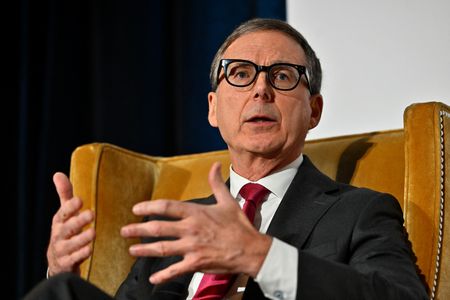By Steve Scherer and Kanishka Singh
OTTAWA (Reuters) -Bank of Canada Governor Tiff Macklem said on Thursday that the economy remains overheated and the jobs market is too tight, as he kept the door open to future interest rate hikes.
On Jan. 25, the Bank hiked its key interest rate to 4.5%, the highest level in 15 years, and became the first major central bank to say it would hold off on further increases as long as prices eased as forecast.
The bank forecasts inflation to slow to about 3% by the middle of the year from 6.3% in December, and to come down to its 2% target next year.
Macklem reiterated the bank’s policy stance, but acknowledged the impact of last week’s strong January jobs report.
“The labor market is just too tight. It does need to get better balanced,” Macklem said during testimony to the House of Commons finance committee.
Canada added a massive 150,000 jobs in January, ten times expectations.
The bank last month forecast the economy would stall and could tip into recession during the first three quarters of this year, but the jobs report showed demand is still strong.
“The Canadian economy remains overheated and clearly in excess demand and this continues to put upward pressure on many domestic prices,” Macklem said.
“The tightness in the labor market needs to ease, wage growth needs to moderate and service price inflation needs to cool” or else more interest rate hikes will be needed, he added.
In a separate speech later in the day, Deputy Governor Paul Beaudry said the bank is committed to bring inflation back to target and will do so even if its policy-setting path diverges from central banks in other countries.
The U.S. Federal Reserve has yet to pause and two Fed officials on Thursday said higher rates would be needed to tame inflation. At its last policy meeting, the Fed lifted its benchmark overnight interest rate by a quarter of a percentage point to the 4.50% to 4.75% range.
Macklem was pressed to comment on the potential effects of the upcoming 2023/24 federal budget.
“If government spending contributes more to aggregate demand at a time when we’re trying to cool the economy, then that wouldn’t be helpful,” he told the committee.
Finance Minister Chrystia Freeland has said repeatedly that she will take a “fiscally prudent approach” to the budget, due out in March or April, so as not to make the central bank’s inflation-fighting job more difficult.
(Reporting by Steve Scherer and Kanishka Singh, additional reporting by Dale Smith; editing by John Stonestreet and Josie Kao)

